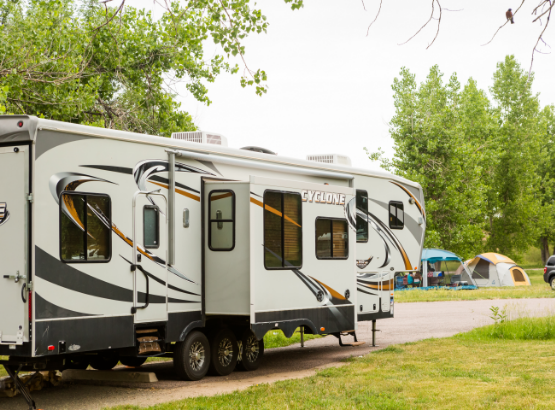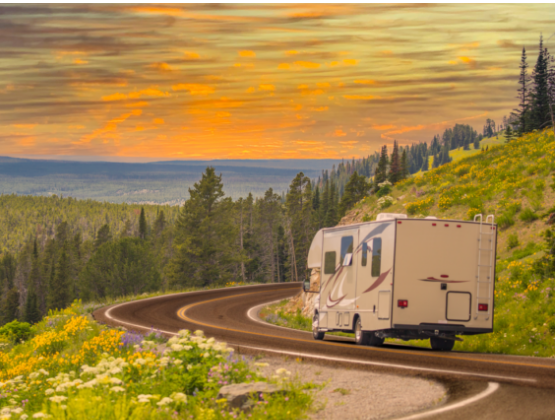RV Buying Guide: What To Consider Before Shopping
RV Buying Guide: What You Should Know
Recreational Vehicles (RVs) are a significant financial investment. Buying a motorhome or recreational vehicle is like buying a house and an automobile at the same time. If this is your first time renting a recreational vehicle, you’ll need to think about a lot of things. For your benefit, our review team has put together this RV buying guide.
This guide will go through the many sorts of motorized RVs and advise you on how to obtain the best bargain on the right RV for you.
New vs Used RV: What’s The Best Choice?
RVers can choose between brand-new and pre-owned models. The most cost-effective way to get started is to acquire a used RV for their first RV. Buying a used RV through a dealer is safer than buying one from a private seller, but you may still have to deal with problems that are inconvenient. New RVs come with a manufacturer’s warranty and an optional extended warranty that may be purchased from the dealer. A safety net is in place should something go wrong. In the case of secondhand goods, this is not always the case.
Buying a New RV
It is not uncommon to purchase a brand-new RV that is only a few weeks or months old off the assembly line. You may even be able to purchase RVs or trailers directly from the RV manufacturers in some situations. These are brand-new vehicles with the extras or customizations that you selected from your dealer when purchasing them. Apart from purchasing a pre-built RV from a manufacturer, this is the most expensive way to purchase an RV.

Pros of a New RV
When you drive off the lot for the first time, you won’t have to be concerned about damage, wear and tear, or other difficulties.
- Color, room arrangement, and more are all variables that can be customized.
- Immediately after you purchase a product, the manufacturer’s warranty is activated.
- New, high-end RVs are shipped directly from the factory to your doorstep.
- The ability to obtain exactly what you desire, at a price you desire, right off the bat.
Cons of a New RV
- Depending on the features you select, the price can vary and be very high.
- Customizing RVs and trailers through the manufacturer can lead to additional costs in the future.
- If local vendors do not have a trailer or RV in stock, you may have to go out of your way to get one shipped.
- The cost of insurance will rise as a result.
- Towing a vehicle may be necessary.
Buying a Used RV
For second-hand RVs, it’s impossible to know how long they’ve been out of production. A used RV may have difficulties that need to be fixed because of the wear and tear. RVs can be purchased via a dealer or a third-party seller, such as on Craigslist or from a private seller. Buyer beware when purchasing a used RV, as you never know what may be wrong with it or what repairs you may have to make in the future. These adjustments can quickly mount up.
Pros of a Used RV
- You’ll save a lot of money this way.
- There are numerous options for remodeling the RV to your specifications.
- You may be able to find the exact RV you’re looking for that isn’t presently in production.
- Capable of customizing, repairing, and upgrading components on your own.
Cons of a Used RV
- You may not know how much the RV has deteriorated in value or what can go wrong with its functionality.
- Even if the damage isn’t immediately apparent, the cost of restoring your RV will be higher whether you have insurance or not.
- In many cases, the warranty period of the product’s creator has expired.
- Can afford to spend a large sum of money on improvements.

The Best Value For Your Money
RV ownership can be a dream come true, giving you the freedom to go wherever your heart desires. Financing an RV can be a big help to many happy campers in their search. Financing your RV makes it easy to find your ideal set-up, whether you’re looking for new or used motorhomes for sale. To discover more about financing your RV, please continue reading!
Best Ways to Finance an RV
Be aware of your credit rating and financial background before applying for an RV loan. At Southeast Financial we have access to some of the best RV lenders in the country and can help you get the financing you need.
Up to 240 months, or 20 years, can be spent on RV financing. Longer financing terms on larger or more luxurious RVs allow purchasers to get exactly what they want without having to make compromises. In addition, financing a smaller RV, like a pop-up camper, over a shorter period, such as 72 months, is common among RVers. Below are some extra expenses you need to consider to get the perfect RV.
Nationwide Recreational Vehicle Financing
Other RV-Related Expenses
Keep in mind that acquiring the recreational vehicle (RV) itself is merely the first step in the process. Purchasing a new or used RV will incur a number of additional costs, including the following:
RV Insurance & GAP Costs
RV GAP insurance protects motorhome owners from losses if something happens to the vehicle while they are still making payments that go beyond the RV’s value. Gap insurance costs $400 to $700 from a dealership and $20 to $40 annually when added to car insurance.
RV Maintenance Costs
Your RV’s wear and tear determines how much maintenance it will require. According to Mobile Homes Parts Store, the annual maintenance costs range from $500 to $1,000.
RV Storage
Traditional storage solutions might cost anywhere from $90 to $200 each month, depending on the model of RV you buy.
Fuel
New RVers don’t always understand their fuel capacity and MPG. They may not know the size of their motorhome’s gasoline tank. The high amount of fuel they just paid for can offer them a false sense of security, especially if they don’t realize how low the MPG is. Fuel costs are constantly changing, so it’s important to stay up to date with costs.
AMENITIES
A kitchen, a bathroom, and one or more sleeping facilities are the standard conveniences found in recreational vehicles (RVs). For amenities, you’ll need to also look out for the costs of:
- Gas & Propane
- Cable & Internet
Finding the Right RV For You
As with most things, you need to get the type that fits better with your lifestyle, and the same goes with RVs.
Types of RV
Class A Motorhomes
Class As are mobile residences. This motorized RV type might be modest or come with king-size beds, washers, dryers, and even sports car-sized mobile garages. Class A offers spaciousness and elegance. Motorized Class A RVs may even tow cars.
Size: 26 to 45 feet.
Weight: 13,000 to 30,000 pounds.
Class C Motorhomes
Class C is between Class A, and Class B. Class C RVs have sleeping rooms over the cab and in the back, and they may have slide-outs like Class As. Class C RVs have separate bathrooms, although Class B camper vans may not. Class Cs are good for people who desire something smaller than a Class A but think a camper van is too small. Class C RVs can’t tow a car.
Size: 20 to 30 feet
Weight: 10,000 to 13,000 pounds
Class B Motorhomes (AKA Sleeper Vans)
Motorized Class Bs are mid-size RVs that are substantially smaller than Class A RVs. These compact campers might be basic (sleeping, storage space) or contain bathrooms, dining spaces, and room for six. Class Bs don’t have as much space or amenities as Class As and Cs, but they can fit in many parking spots, stay off the grid, and are easy to drive.
Size: 17 to 23 feet.
Weight: 4,000 to 9,000 pounds.
Travel Trailers
The travel trailer category has the most campers. To appeal more and accommodate families, many RV brands have evolved to have additional sleeping capacity using the same amount of space adding bunkhouses and bunk beds to their travel trailer floor plans. Bumper pull travel trailers are lightweight to hefty and connect to a conventional trailer hitch. Small travel trailers can be pulled by a small SUV, while others require a large truck. Travel trailers are useful for campers who want to unhitch and store the camper more quickly, and there are many alternatives.
Size: 10 feet to 40 feet
Weight: 1,100 to 12,000 pounds
BONUS
Truck Camper: A small recreational unit attachable to a pickup truck at the the bed or chassis. Think of truck campers as a detachable version of the Van Conversion or Class B motorhome, with smaller amenities and space.
Fifth Wheel: This is the most spacious of all the RV types, with a large front axle designed to be hitched to a large truck or pickup bed. This RV type is also popularly used as a toy hauler for some RVers.
Where To Buy an RV
There are three main ways of buying an RV:
- RVs are typically bought from RV dealerships, like cars. RV dealers may sell one or several brands.
- Buying an RV online is the best method to see all of your possibilities. It’s also a good method to save money.
- If you’re shopping for a used RV, explore online and in local newspapers for classifieds via private sellers.
Questions To Choose Your RV
What’s Your Camping Style?
Ask yourself how you want to camp once you have a general idea of how frequently you will be camping and who you might be camping with. Whether you want to brave the great outdoors or you want to drive cross country and explore national parks instead, this will assist you in deciding which amenities or features are essential versus optional for your RV.
Are you a backcountry traveler who likes to pursue the undiscovered path? An RV that allows for greater flexibility to reach remote locations is the ideal choice for boondocking. You might also think about RVs outfitted for off-road travel that are ready for adventure. You can also extend your time off the grid by using an RV with solar power and a bigger water tank.
Will You Live in the RV Full Time?
Not everyone is suited for the nomadic lifestyle because full-timing differs considerably from a weekend getaway or a weeklong vacation. Speaking with other full-time RVers is a great way to learn about the RV lifestyle. Inquire about the benefits and drawbacks. Generally speaking, RVers are a nice group who are eager to help and share their experiences.
Southeast Financial
Allow Southeast Financial to guide you as you navigate the complicated world of RV and camper financing. We can help you discover the perfect financing options for your next RV or camper since we have the network, connections, and web resources!
Last but not least, keep in mind that purchasing an RV is all about enjoyment and new experiences. If this is your first time purchasing an RV, take your time to find the best bargain on the ideal RV to assist you in getting on (and off) the road.

